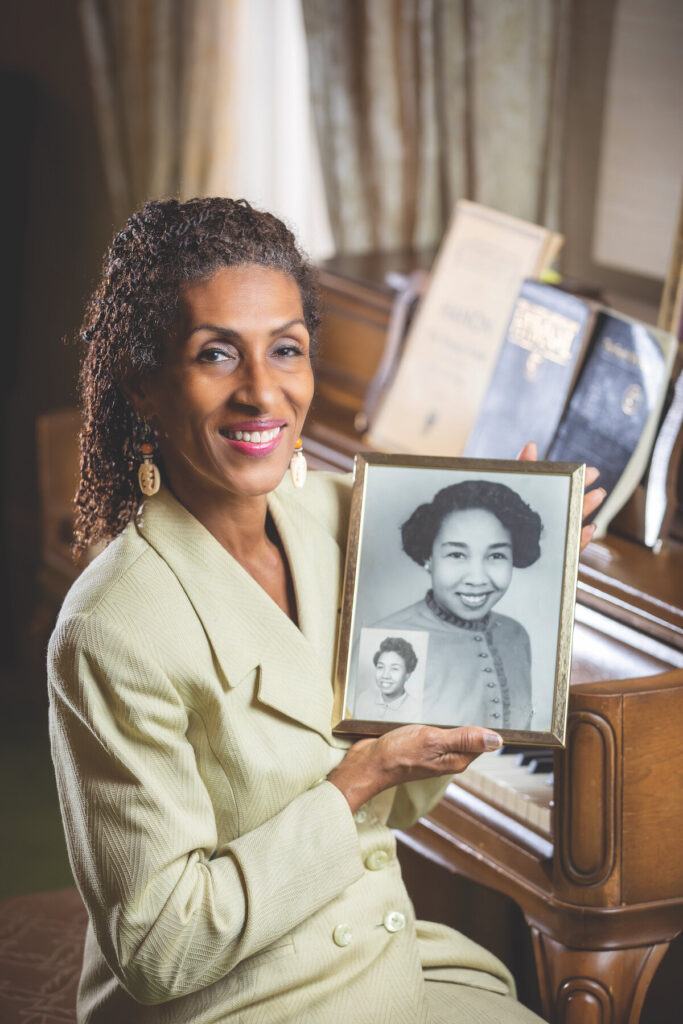By Sara Bongiorni
Laurabeth Henderson Hicks, PhD, spent her elementary years inside a segregated, one-room school in Depressionera Las Cruces, New Mexico. The teacher was Laurabeth’s mother, who had moved her family to the New Mexico desert from Galveston, Texas. She taught Laurabeth and seven other African American children subjects from math to piano. Outside of class, Laurabeth explored the desert with her brother. She learned to patch chinks in the walls of the family’s adobe house with mud.
Vickie Casanova-Willis with a photo of her aunt, Laurabeth Henderson Hicks
Vickie Casanova-Willis with a photo of her aunt, Laurabeth Henderson Hicks
Las Cruces was a formative chapter in an extraordinary life shaped by family, music and scholarship, one that ended in October with Dr. Hicks’ death at 99.
She punctuated the end of her life with a $70,000 gift to the Baton Rouge
Area Foundation, whose work she followed in the newspaper each morning after greeting the day by listening to the birds and looking out at the trees surrounding her home in Baker.
The Foundation first learned of the gift from Hicks’ niece, Vickie Casanova-Willis. “She believed that you share what you have,” Casanova-Willis said. “She was a realist but also an optimist who saw a half-full glass and wondered how she could fill it a little more.”
Teacher, educational psychologist, counselor and researcher, Hicks was a leader in educational psychology at Southern University and elsewhere who also analyzed education policy for the U.S. government.
Hicks was instrumental in establishing the counseling center at Southern, where she was the Lab School’s counselor. She was the first African American president of the Louisiana Counseling Association and the first counselor at the University of Minnesota’s lab school.
Titles of her scholarly articles are resonant decades after she wrote them. A 1977 article for Educational Leadership, for instance, posed the question, “Schools Children Like: What Do They Say About Them?”
Hicks broke ground alongside her husband of 55 years, Dr. William R. “Bill” Hicks, former dean of the school of education at Southern and a World War II veteran who served in Europe and the Pacific.
The couple met at a USO-style gathering for soldiers returning from the war, work in which Laurabeth’s mother was deeply involved. Together the Hicks earned doctorates from the University of Minnesota while working and living in Port Arthur, Texas, where Laurabeth
had her first teaching job after graduating from Prairie View A&M University.
Each summer for years, the couple packed up the car and drove to Minnesota to complete coursework, then returned to Texas for the school year. The Hicks were the first African American couple to complete their doctorates together at the University of Minnesota.
They broke ground outside of academia, too. The Hicks helped develop the Parkwood Terrace subdivision in Baker, where Laurabeth Hicks remained in the couple’s longtime home until the final weeks of her life.
She was in the business of encouraging young people, and she changed Baton Rouge for the better, off and on the Southern campus. Hicks helped found the DeBose Foundation, named in honor of the university’s legendary professor of piano, Tourgee DeBose. The arts organization hosts a national piano competition in Baton Rouge each year.
Piano was a great love, and Hicks played more or less every day for most of her life, including in the weeks before her death five months shy of her 100th birthday. She liked jazz and hymns. “How Great Thou Art” was a favorite.
Her quiet humor, sharp mind and keen interest in other people made her a beloved presence in every circle—aunt, friend, neighbor. Her laughter was like music. Her favorite way to spend her free time mirrored the focus of her distinguished professional life.
“Talking to people, without a doubt,” Casanova-Willis said. “She could sit down with anybody from any walk of life and have a great conversation about football or music or politics. She was comfortable in her own skin, and she believed in the good in people.”
She loved to share stories, especially about her mother and the years in Las Cruces. She loved listening even better. Hicks let others set the pace of conversation with patience and quiet observation that she credited to playing the piano during church services as a teenager in Las Cruces.
“Those were skills that were important to her later work that she developed during the services where she played,” Casanova-Willis said.
She never forgot her roots and didn’t want to. She retained the conversational Spanish she learned from Mexican playmates in Las Cruces. She sent money for the rest of her life to an organization that supports Native American communities in the Southwest.
Like her husband, Hicks had opportunities to work and teach across the country. She chose Baton Rouge and Southern and its important role as a historically black university.
“She always contributed to the benefit of children and young people,” Casanova-Willis said. Her gift to the Foundation “is a chance to continue that work.”

